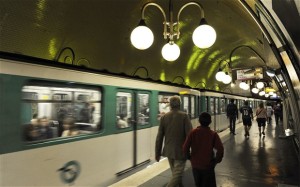Coldest NFL Games
Human Interest News — Posted on January 6, 2014

Fans watch the legendary Ice Bowl game between the Dallas Cowboys and Packers in Green Bay in 1967.
Top 10 coldest games in NFL history
(before Sunday’s Packers game against the 49ers)
(from the NFL website)
10. Dec. 22, 1990 – Lambeau Field
Green Bay Packers vs. Detroit Lions
Temperature: 2 degrees
9. Jan. 15, 1994 – Ralph Wilson Stadium
AFC Playoff: Buffalo Bills vs. Los Angeles Raiders
Temperature: 0 degrees / Wind chill: -32 degrees
8. Dec. 26, 1993 – Lambeau Field
Green Bay Packers vs. Los Angeles Raiders
Temperature: 0 degrees
7. Dec. 10, 1972 – Metropolitan Stadium
Minnesota Vikings vs.Green Bay Packers
Temperature: 0 degrees / Wind chill: -18 degrees
6. Dec. 3, 1972 – Metropolitan Stadium
Minnesota Vikings vs. Chicago Bears
Temperature: -2 degrees / Wind chill: -26 degrees
5. Jan. 20, 2008 – Lambeau Field
NFC Championship Game: Green Bay Packers vs. New York Giants
Temperature: -4 degrees / Wind chill: -24 degrees
4. Jan. 4, 1981 – Cleveland Municipal Stadium
AFC playoff: Cleveland Browns vs. Oakland Raiders
Temperature: -5 degrees
3. Jan. 7, 1996 – Arrowhead Stadium
AFC playoff: Kansas City Chiefs vs. Indianapolis Colts
Temperature: -6 degrees
2. Jan. 10, 1982 – Riverfront Stadium
AFC Championship Game: Cincinnati Bengals vs. San Diego Chargers
Temperature: -9 degrees / Wind chill: -59 degrees
1. Dec. 31, 1967 – Lambeau Field
“The Ice Bowl” – NFL Championship, Green Bay Packers vs. Dallas Cowboys
Temperature: -13 degrees / Wind chill: – 48 degrees

The “manners” section invites Parisians to help out lost tourists “in bermuda shirts with a metro map in one hand and the other hand in their hair (Photo: David Rose)
Paris metro bosses release ‘politeness manual’
Paris’ public transport body has released a special “politeness” manual to reduce uncouth behaviour in the metro, with a list of “commandments” on how to improve civility from helping clueless tourists to ensuring body odor is not wafted around the carriage.
The online “manual on savoir-vivre for the modern traveller” includes an array of tips split into four categories: “helpfulness”, “courtesy”, “manners” and “politeness”, drawn up from among more than 2,000 suggestions from the general public.
The first “commandment” on the platform defines courtesy as “understanding that the huge crossed out cigarette on the platform is not a work of art but a ban on smoking.”
The “manners” section invites Parisians to help out lost tourists “in bermuda shirts with a metro map in one hand and the other hand in their hair.”
“It’s worth losing two minutes of your time for a good cause if only to hear the (foreign) passenger struggle to pronounce (the metro stops) ‘Trinité d’Estienne d’Orves’ or ‘La Motte Piquet-Grenelle’,” the accompanying text says.
“Helpfulness” is defined as “holding the door open to the person behind you. In life, never miss an opportunity to exchange a pretty glance.” It is also described as “taking an old lady’s bag on the stairs and returning it to her with a smile at the top.”
The “heads down tribe” are invited to drop their smart phones for one minute and discover how much more gratifying it is to help the aged.
“Politeness,” meanwhile, is “not only using a handkerchief to wave someone off on the platform” – but keeping one’s germs to oneself. Once on the train, passengers are invited to not to “provoke a duel with the cavalier who just squashed your toes by mistake” and “like a king penguin, to keep one’s arms by one’s sides on very hot days and grab the bottom of the post, not the very top” to avoid spreading body odor.
Users of public transport are invited to add their own observations on the campaign website.
The Parisian campaign comes two months after Transport for London launched a week of “poetiquette” recitals at busy stations, using poetry to teach the capital’s commuters to think twice about dropping litter, obstructing doors and other anti-social behaviour that contributes to travel delays on the tube.
Last year, France’s state-owned railway operator announced the creation of almost 3,000 “polite police” with tough new powers to eradicate bad manners on the nation’s intercity trains. The SNCF employees are tasked with tackling the exploding number of complaints about rude or unruly passengers that have rocketed by 25 per cent last year.
Traveller gripes include spitting on and insulting ticket inspectors, putting feet on seats, pulling emergency alarms without reason, speaking loudly on mobile phones and playing music and damaging train interiors.
SNCF boss Guillaume Pepy said a “line has been crossed” in “uncouth behaviour and delinquency” blighting the lives of many of the four million people who use his company’s trains everyday.
“Impolite behaviour generates a feeling of anxiety and discomfort,” said Mr Pepy, adding that it posed a “real obstacle” to weaning the French off their cars in favour of public transport.
Eight years on the lam, escaped zoo flamingo living large in Texas
(Reuters) – An African flamingo that escaped a Wichita, Kansas, zoo eight years ago has been spotted living with a companion cavorting in the Gulf of Mexico, some 670 miles to the south.
 The five-foot tall bird, more white than pink and still wearing a leg band bearing its zoo-assigned number, 492, was seen last week in an inlet off Port Lavaca, Texas, by birder Neil Hayward, who described the sighting in a blog.
The five-foot tall bird, more white than pink and still wearing a leg band bearing its zoo-assigned number, 492, was seen last week in an inlet off Port Lavaca, Texas, by birder Neil Hayward, who described the sighting in a blog.
The sighting didn’t surprise Scott Newland, curator of birds for the Sedgwick County Zoo in Wichita, which the bird departed in 2005.
“Every year or so we get a call,” Newland said, noting that the African species is not a normal sighting for North American birders.
The flamingo escaped in summer and was first sighted in Wisconsin, Newland said. Apparently seeking warm weather, the bird has spent most of his escape around Texas and Louisiana, Newland said, citing reports from bird-watchers.
The bird, which had come to the zoo in 2002, escaped after keepers failed to clip his wings.
“As soon as he had the chance, he flew out of here,” Newland said. “His instincts are honed to do that.”
The zoo has never attempted to retrieve the bird, which began its life in the wild and is naturally wary of being approached by people, Newland said. The flamingo is 18 years old and could live to 50, Newland said.
For years, the bird has been seen with another banded flamingo, which Hayward said came from a colony reared on the northern tip of Mexico’s Yucatan peninsula. Flamingos pair up for life, but the genders of the two flamingos are unknown, Newland said, even though he refers to the escapee as a “he.”
While a little embarrassed that the flamingo flew the coop, Newland says he is happy to know that it is thriving in the wild after three years in the zoo.
“It’s a testament to the adaptability of these animals,” he said. (Reporting By Kevin Murphy; Editing by Scott Malone)
From the NFL website, London’s Daily Telegraph and Reuters
